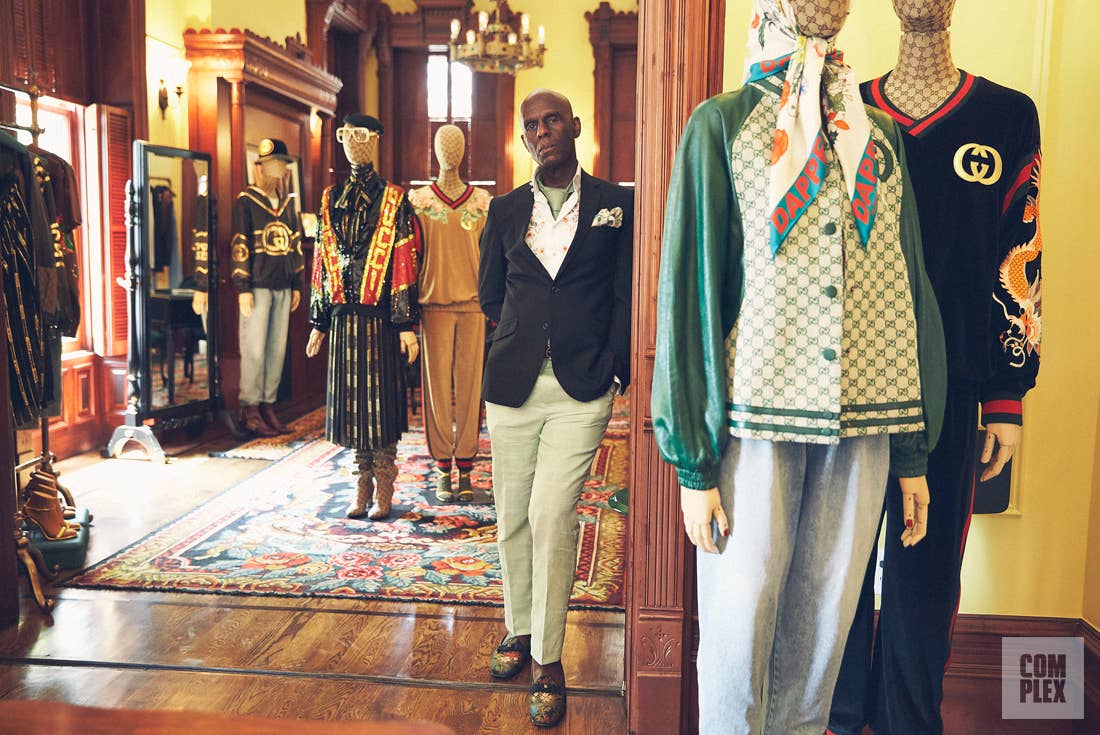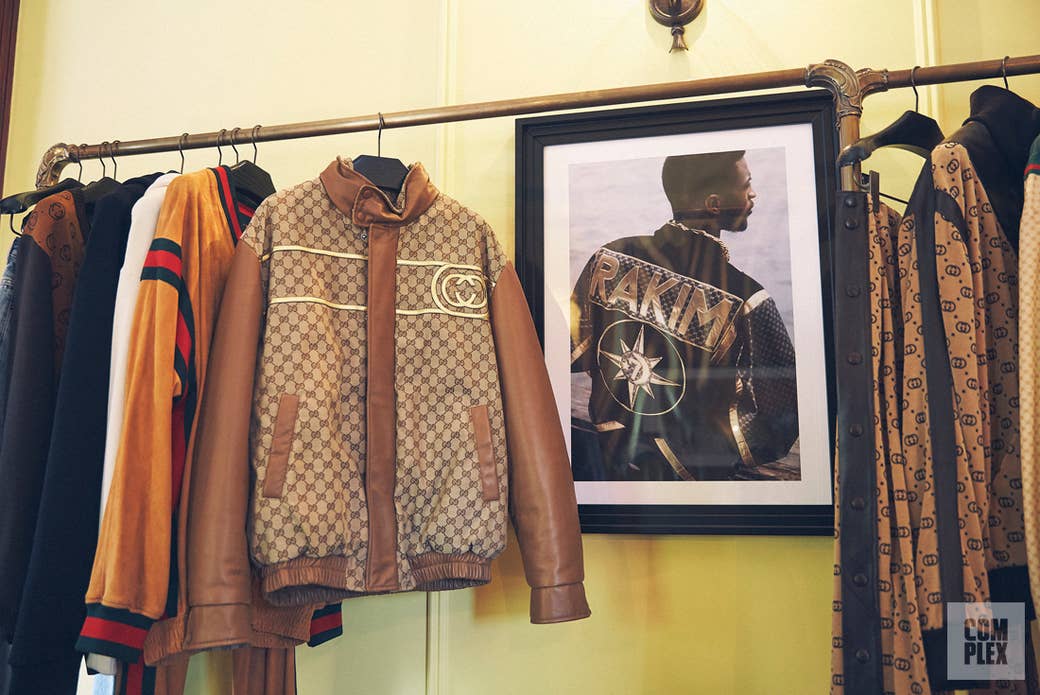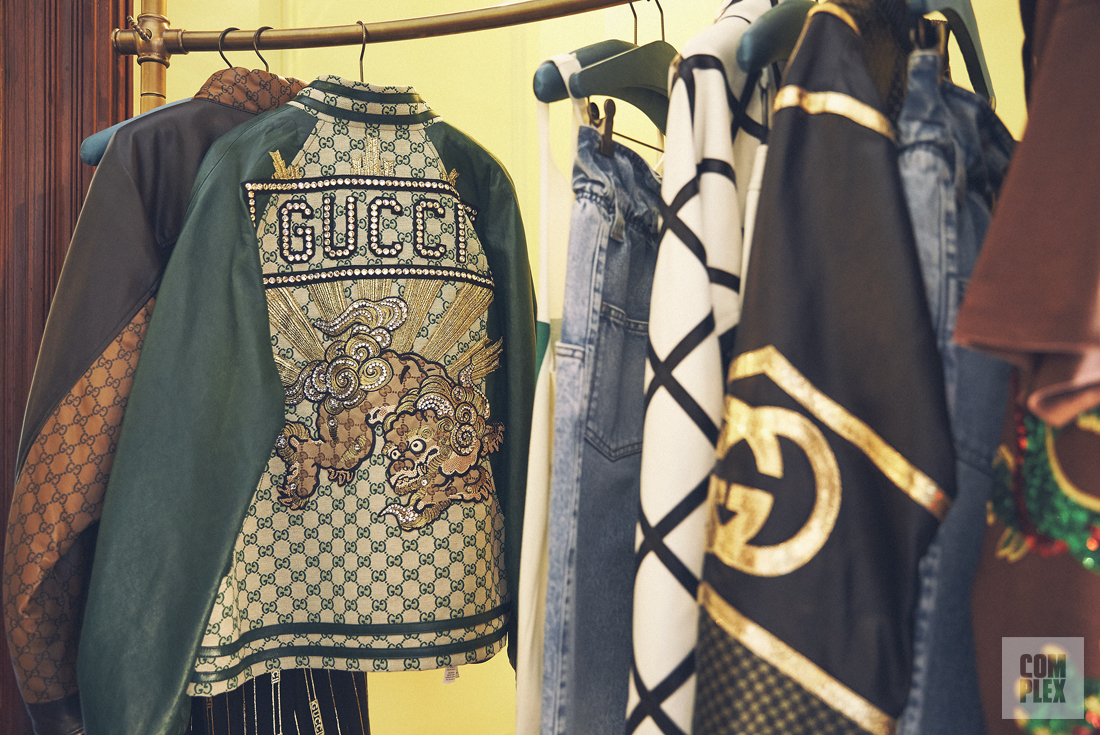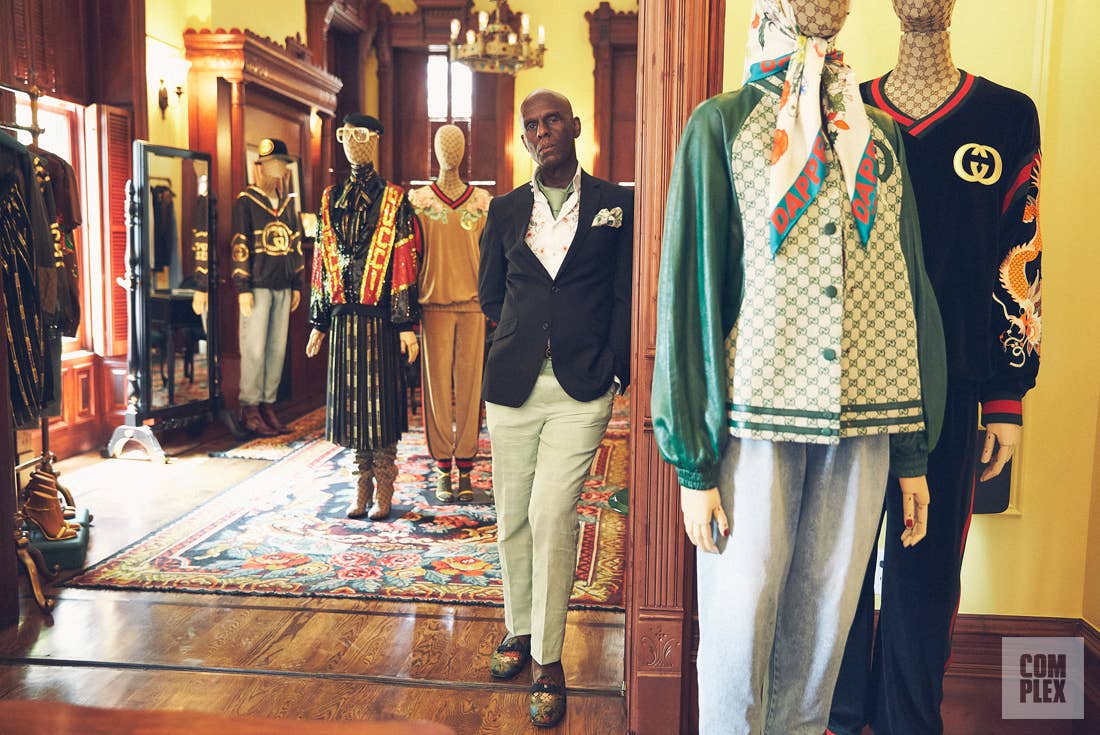
Dapper Dan is dressed to the nines: pale green linen trousers with a navy blazer, a matching ascot tucked inside of a white crisp shirt, topped off with Gucci oversized embellished shades, a logo belt, and flower loafers. If it were anyone else, one might assume the attire is indicative of a special occasion; today, there is a photo shoot inside of his Gucci atelier in Harlem. But for the man who single-handedly influenced not only Harlem and hip-hop, but fashion overall with an aesthetic of “more is more,” his fit is an everyday uniform.
Thirty years ago, Dapper Dan opened his Harlem boutique where he sold custom-made luxury clothing to everyone from LL Cool J to Eric B. and Rakim and Olympic track star Diane Dixon. His mission was to use luxury brands like Gucci, Louis Vuitton, and Fendi to create his own version of what high-fashion could look like for the people around him. Think Louis Vuitton sweat suits, Gucci fur jackets, and even decked-out car interiors. To him, luxury wasn’t about being subtle, it was about being seen. Hence, his use exclusively of the luxury brands’ logos, tenfold, lighting the spark for what we’d call “logomania” today.
Except there was one issue. Dapper Dan hadn’t been granted permission by Gucci, Fendi, or Louis Vuitton to use their logos, and was eventually issued a cease and desist, which later resulted in shutting down his boutique.
But while Dapper Dan might have closed up shop, his influence still lives on, especially on the fashion runways today. Back in June 2017, Gucci sent a model down the runway wearing a fur bomber jacket with Gucci logo puffer sleeves at its 2018 Cruise show. The jacket looked very similar to an Louis Vuitton one that Dapper Dan created for Diane Dixon in 1988. Gucci claimed it was paying homage to Dapper Dan, but many felt the fashion house was copying the legendary Harlem tailor. The controversy sparked conversations around what it really means to “pay homage” and how that should be done properly. Gucci Creative Director Alessandro Michele came out to say that the collection was indeed inspired by Dapper Dan and later took it a step further by offering Dapper Dan the opportunity to collaborate with Gucci, and most importantly reap the monetary benefits.
Now, Dapper Dan in collaboration with Gucci has released his first Gucci-Dapper Dan collection, which is inspired by his archive of pieces from the ‘80s and ‘90s, but updated with a slight twist on logos, fabrics, and appliques. There’s Gucci logo sweatsuits, backpacks, puffer jackets, fanny packs, ‘80s style jeans, and sneakers. Everything you’d need for a standout Dapper Dan fit.
“It's like I took something, a woman I was in love with and eloped because I didn't have permission. But now it's a sanctioned marriage,” Dapper Dan says.
Complex visited Dapper Dan at his atelier in Harlem to view the new collection. While there, we also talked to him about his inspirations, what he really thinks about streetwear, and black culture.

There are obvious nods to some of your most iconic looks from the ‘80s and ‘90s in your Gucci-Dapper Dan collection. How did you decide which looks to update and recreate? What message did you want to get across with this collection?
This collection is the whole concept of what was going on in the ‘80s and the ‘90s with the touch of… You know how they imagine that somebody's missing and then they go on, they take a software and try to imagine how they would look like today? That's pretty much what this is. You know it's the same person but it just got more sophisticated, more updated.
But a lot of these looks are also very timeless. So what do you think makes something timeless?
What makes the pyramids timeless? The story associated with it. So I think it's the story associated with this, that's timeless. That gives it the life that it has.
What was your first encounter with luxury fashion, how did you start having an affinity with high-fashion brands?
If you was eating spam sandwiches all your life and you saw a steak, you ain't gonna never forget about that steak. You going to be looking forward to the day where you could have steak. That's what it's like. Anybody can buy a can of spam, but if you can go into a really expensive restaurant and order steak dinner, then that's transformative. And that's what the clothes mean. The clothes was transformative. So in the beginning, I didn't look at it as just garments. I looked at it as how luxury brands made me feel. It's like being in love with a sport. Every time you get to play, you fall in love. And that's what luxury brands were for me.
What do you think makes Harlem style distinct?
Harlem style has this strong gravitational pull towards masculinity, because it's like the pecking order in the hood. The toughest guy determines the style. I think it's always been musically based and gangster based. John Dillinger was a gangster, but why was John Dillinger popular? Because it was a period in American history when people were very poor and he robbed banks. He was like a modern day Robin Hood. In Hollywood, you have these antiheroes—James Cagney, Humphrey Bogart, and George Raft. In music, it generated this masculinity of standing up to the system, getting you some money, tough guy things. So therefore, the guys older than me, that's the way they dressed and that was passed down to us.
Once you left the Cagney and the Bogarts and George Raft, it shifted to the Rat Pack. And then from the Rat Pack you got Frank Sinatra, Sammy Davis Jr., and Nat King Cole. They generated this style, which was behind jazz. The jazz age going into the great American music age, Tony Bennett, that whole crew, that was in. Then that shifted to maybe rock 'n' roll. But, rock 'n' roll didn't have that much of an effect. It got too costume-y. When James Brown came out, nobody ever dressed like James Brown. That was completely out, you know?

Yeah, it wasn’t realistic, in terms of style.
Then the birth of hip-hop happened. Nobody dressed like The Sugar Hill Gang. You saw the stuff they wore. They borrowed that from rock 'n' roll. But that didn't have a strong enough relationship with the street. It was too stage-y.
As hip-hop emerged, it changed. But hip-hop rolled off the backs of the gangsters and the street. So there was a shift from going all the way back to the Cagneys and the Rat Pack, and now we have a new music platform, hip-hop, and needed a new gangster look. The new gangster look, it extracted some things from the past, like furs were still popular, alligators, those type of things but with a different sense of style. And that's where I come in, modifying that style and transforming it into what's known today as logomania.
Do you think not being involved in fashion in a traditional way has been beneficial to how you made an impact?
Oh yes, yes. Fashion is determined by the pecking order of culture. The stronger the culture, the more impact the culture has, the stronger the fashion is. Everything happening with fashion that came out of what I was doing was cultural-based. It had to be cultural-based, it had to be something so strong that it had to make a difference.

In a New Yorker profile, you called what you did with Gucci and Fendi and Louis Vuitton “africanizing.” Which I think is ironic, considering the history of colonization, but it's also a great metaphor for how black people approach style, taking simple things and amplifying them. What do you think it says about the relationship that black people have to luxury?
That's true of black people, but that's a trait we inherited from the Italians as well. A lot of the styles here in Harlem developed because we had the first Little Italy in Harlem, and a lot of the things we developed came to us by way of the Italian community. And, I mean, we came over here with it, with colors and our perception of diamonds, royalty.
It's like, it has more to do with an identity crisis. You want everybody to know "I arrived. I'm somebody now.” That's why you see Cadillacs and Mercedes-Benz parked in front of projects buildings, because once you came out the projects and you climbed into your Mercedes-Benz with your silk suit on, you was a different guy.
And, what is the beauty and importance of looking like you have money? Why is it important to your identity?
You heard of Sugar Hill, right? The history of Harlem is like, we had a Jewish community first. Then after the Jews we had a middle-class African-American community, and they live up on Sugar Hill. And then after that you had a lower-class black community come, and we lived in the valley. And the upper-class African-Americans lived further up on the hill, you know, Sugar Hill. So the only way you could tell the difference between us was the way we dressed. I saw an older lady on the bus, she was even older than me, she said if you came from the valley, they would snub they nose at you. But when you go to church, nobody would know whether you came from Sugar Hill or the valley. Like on Sunday, you heard of the term "go to meet in Sunday," right, Sunday go-to meeting clothes. Everybody dressed up. But you couldn't tell who was from the valley and who was from Sugar Hill. It was transformative. So, we have the transformative things that clothes can do. And then, you have to have the symbols within the garments that states that "I have arrived." The garments could be mink, diamonds, furs. But the transitional stage came when I opened up the store and said, "Okay, why Louis Vuitton, Gucci, and Fendi?” Why? Because people realized that brands were taking over the space that the Rat Pack had.
There are a lot of luxury brands today that are using black culture and hip-hop to market to the urban market, but also make themselves seem cool. What are your feelings about the shift that fashion is taking, leaning on hip-hop and black culture to make a statement?
You say black culture. Then, when you look at the platform, Mick Jagger, the Beatles, is that part of black culture? It is. I don't think the public is getting it right. We influence each other. Mick Jagger and the Beatles, they talked about it all the time, what their influences were. Elvis Presley, and all these guys. If it's anything, black culture is when you strike the match. But, when everybody else getting in, is when you light the fire, that’s American culture. What causes the match to get struck in the first place is like, I don't feel like I need to be something else, I need to do something. So, you strike the match.
I had a group of kids in here the other day, Misa Hylton’s group. I asked all the kids in here what their preferences were. Only two of them was from upper class and wore Ralph Lauren. They wore Ralph Lauren because their parents wore Ralph Lauren. There was no need for them to strike a match. That's luxury passed down. When you don't have luxury passed down, when you don't have a strong identity or culture platform to draw on, then you create that platform. You strike that match.

How do you think brands can or need to pay homage or acknowledge who lit the match? What is the correct way to have that relationship without being exploitative or erasing origins?
That's the golden question of this age. When you look at hip-hop, when you look at fashion, even musical forms, it's not the same. For instance, there’s reggae and reggaeton. You know there's a slight difference, right? So what do you call that? Musical forms borrow from each other. But when it gets to fashion, everybody gets all twisted. You know, so it's a more sensitive thing.
Why do you think it's more sensitive?
It gets more sensitive when it leaves the initial group. The problem with it is when people can't share in the prosperity generated by a particular culture. That's when it gets a little ugly.
But the important thing about culture and how we borrow and influence each other, you have to take a look at the Zoot suit and then when you go to the Zoot Suit Riots and who was getting beat up for wearing the Zoot suits. Filipinos was getting beat up, Italians were getting beat up, some Irish were getting beat up, and all of us were getting beat up because of the Zoot suits. Here is an element of fashion that is popular straight across the board.
When I say straight across the board, I'm not talking about Anglo Saxon, Protestant, American, but the Irish, the Italians, the Filipinos, all of them were wearing the Zoot suits and they were literally getting taken off public transportation and getting beat down during the Zoot Suit Riots. So that borrowing, that influenced the culture sometimes, it goes across the board. So if you suffered the consequences on the dark side, you should be able to suffer the same on the other side too.
"Gucci only had two Gs, I gave you all the Gs that I could find."
Lots of people say that your brand helped define “luxury streetwear.” It’s a term used to describe a lot of collections today. How would you define the term “streetwear” and how do you think it's changed over the years?
First, I don't like the term streetwear. Fubu, Cross Colors, and Karl Kani, they had the name streetwear, but that should be a separate category because what they did between luxury brands was they took it downstairs. When they took it downstairs, I categorize that as streetwear. I don't associate nothing I do with that. My intention wasn't to take it downstairs, it was to create something for my community that was upstairs, but just was different. When you see games with it and guys with their pants down, that's streetwear. I wanted something you could wear to church, not something you wear to the park. Something that you go into an exclusive club with. Not you going to stand on a corner with.
When you’ve described your brand as aesthetic, you mentioned that you identify with ghetto fabulous as opposed to streetwear. What's your relationship with that term?
Ghetto fabulous says this is ostentatious based on what already exists, and that's OK. You take luxury and you give them more. Paolini gave you one horse, I gave you herds. You know what I mean? Gucci only had two Gs, I gave you all the Gs that I could find.
I read inThe Guardianthat Louis Vuitton put your name as a reference in their show notes when they presented the Supreme collaboration. What's it like to be referenced, but not necessarily always compensated and consulted?
They issued letters to everybody who was present when they did their 2018 line. Everyone who went to the show, there was a letter on each chair for every attendee stating that this collection was influenced by Dapper Dan. Which is Supreme, so what can I say? You know, what can I say? “Everybody's paying homage to Dapper Dan, but nobody paid him." And so Gucci changed all that. So that sums it up. How do I feel about that? I mean if I wasn't sitting down, I'd kick my heels.


